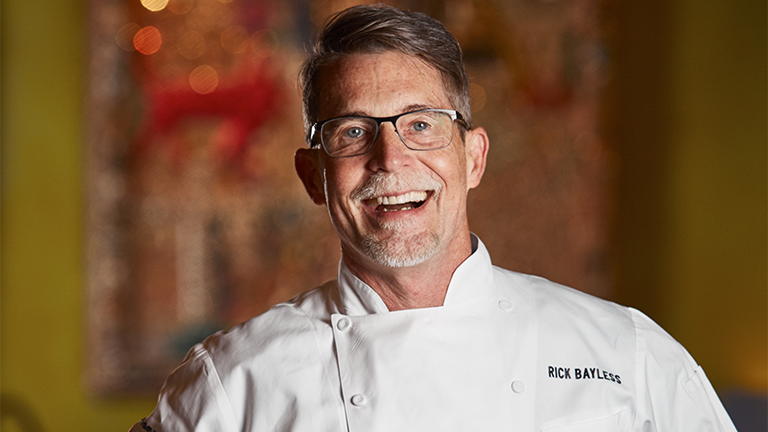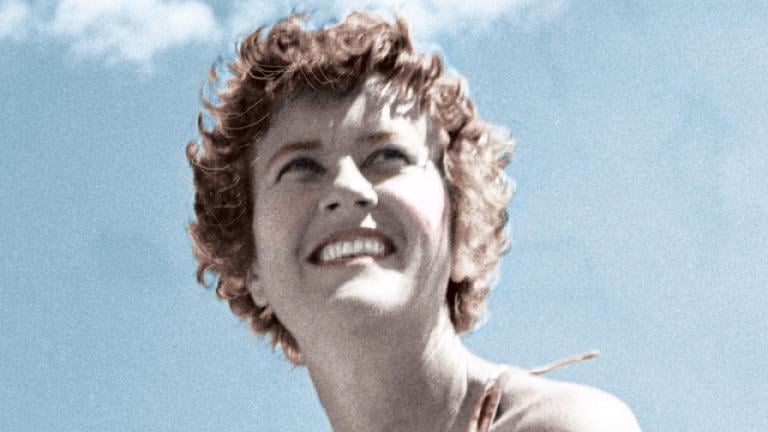She was neither French nor an actual chef. But Julia Child's PBS series "The French Chef" captured the country's attention and changed the way we thought about food. Her recipes, while not always simple, were guaranteed to work, and had a flavor that couldn't be imitated by food from a can. She made mistakes too, endearing millions of home cooks who saw in her a little bit of themselves.
To mark what would have been her 100th birthday, Bob Spitz has written a new biography of Julia Child, Dearie: The Remarkable Life of Julia Child. Read an excerpt of his book. We've also posted videos of Child from our archives--interviews from 1978 with John Callaway and 2001 with Phil Ponce.
We spoke with Spitz about what he learned in writing his book.
One of the things I didn’t realize until I read Dearie was how much of an impact Julia Child had on public television.
She launched PBS in her own crazy way. She appeared at a local station which is now WGBH, the monolith. It was a time when you had to look around the dial for educational TV stations, and make sure your rabbit ears were on the right way. It was mostly college professors delivering lectures. But Julia came along and realized her show was so popular that they would send out a tape of her show to other stations. It was some of the first syndication—before Sesame Street. She was one of the pioneers.
Did you ever meet Julia?
I was in Sicily and writing for American magazines. She was 82 and was trying to school herself in Sicilian food, and spent three months there going to different restaurants. Her knees were going and she needed a young arm to hold on to. So I spent three months eating food and got 40 hours of great information. I did a number of short pieces about Julia, but kept all the intense research for the book. She was very intimate in our discussions. She was involved in a biography at the time and it wasn’t going well. She said, “Oh, they’re making me sound as if I’m already dead.” Julia was full of spirit and she felt that wasn’t being conveyed. She also felt you couldn’t smell the food on the page.
Was she recognized in Sicily?
She was recognized everywhere by Americans. But when we went into a restaurant, she would charge right into the kitchen and dip her big paw into the pot and taste the sauces. She did that all the time in America, but she couldn’t get away with that in Italy, and we got chased out of those kitchens with knives. They didn’t know who the hell she was.
Did you or your family ever watch her on TV?
Julia saved my childhood. My mom was a terrible cook, sorry Mom. She made brisket that the Jets would call on Monday and ask if they could use it as the game ball. But then every Monday night, my mom would sit with a yellow pad on her lap and take down Julia’s recipe, and it would be her meal the next day. And it was delicious. And it’s how I learned how to cook myself.
Julia had a very scientific approach to cooking—she called it “operational proofs.” What sort of extremes would she go to?
When she wanted to know about fish, she wrote to the Department of Fisheries. If she wanted to know about flour, she would call the Department of Agriculture. She learned everything she could. It’s one of the great reasons for her success. She was relentless. She would roast 50 chickens, every different kind at every different temperature, stuffed or not stuffed, trussed or not trussed, so that when she pulled off her recipe, it would be fail-proof. While they’re complex, she wanted them to be right.
What were cookbooks like before Mastering the Art of French Cooking?
They were very simple cookbooks. They had the same recipes you see in magazines today—a lot of Jell-O molds with mayo in them, casseroles with condensed soup in them. It was revolting, but that’s what my mom served at home. They weren’t very precise, and didn’t draw on classic French cuisine, to be sure. She hoped homemakers would put something delicious on the table, with complex flavors. She did it in droves.
A lot of your book discusses her early life, a sort of aimless schooling where she was resolved not to be a housewife. What was she like in college?
She was a rambunctious young woman who majored in carousing in college. In her 30s, she was adrift in New York and didn’t know what to do with her life. Julia would have none of a typical marriage or a secretarial school. So she held out. At the age of 40, she couldn’t so much as boil water to cook, and at 50, didn’t even own a TV. But she remade her own life in her midlife.






